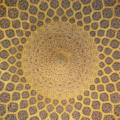Islam  pivots around one central figure. If asked, most non-Muslims would guess it to be Muhammad. Most Muslims, on the other hand, would promptly identify it as God—for everything and everyone comes second. Still…. Muhammad is pretty close on His heels. At least, for a mortal. After every utterance of his name, Muslims bless him; they refer to him as their Beloved; they write countless poems extolling his perfection. And these are examples of just garden-variety respect—I haven’t touched upon the more extreme. Well, okay—here’s one: Upon hearing of his death, one of his companions asked to be blinded so Muhammad would be the last person he ever saw. What’s more, his request was granted!
pivots around one central figure. If asked, most non-Muslims would guess it to be Muhammad. Most Muslims, on the other hand, would promptly identify it as God—for everything and everyone comes second. Still…. Muhammad is pretty close on His heels. At least, for a mortal. After every utterance of his name, Muslims bless him; they refer to him as their Beloved; they write countless poems extolling his perfection. And these are examples of just garden-variety respect—I haven’t touched upon the more extreme. Well, okay—here’s one: Upon hearing of his death, one of his companions asked to be blinded so Muhammad would be the last person he ever saw. What’s more, his request was granted!
So, just who was the prophet Muhammad, and what did he do to warrant such adoration? Well, he was born in Mecca, the location of the Ka’aba, a shrine which at that time housed 300 idols, each of them representative of a different Arabian clan’s god. Each year, the clans traveled to Mecca to pay their respects to their god, and to trade.
According to custom, Muhammad was raised during his first two years in the desert by a Bedouin woman. The desert rigors and its isolation from society were believed to strengthen and purify children. After his parents, and then his grandfather died, he moved in with his uncle at the age of eight. He spent his youth herding goats, keeping apart from the general lawlessness and licentiousness of the times.
As an adult, he managed caravans, and married a wealthy widow fifteen years his senior. Although polygamy was common, he took no other wives until her death. He became widely known as “al-Amin” meaning “faithful, trustworthy” and “truthful”. One illustrative anecdote relates a time during the rebuilding of the Ka’aba, when each significant clan leader wanted the honor of replacing its most valuable rock, the Black Stone. Eventually, they decided to let the next person who walked in settle the matter. Enter Muhammad. His solution? Put the rock on a blanket, thereby allowing everyone to carry it to the Ka’aba.
In his thirties, Muhammad began spending time alone in a mountain cave, where he prayed and experienced vivid dreams. Eventually the archangel Gabriel visited him, and compelled him to recite sacred teachings that were later compiled into the Quran. Central to their message was the assertion that there is only one God. Remember—he was preaching this to a town that vastly benefited from the many tribes who travelled to Mecca for worship of their gods.
Consequently, the town’s leaders attempted to assassinate him, but he escaped to Medina, where he became its leader. Thereafter, upon winning battles, he showed great fairness to his conquered enemies – absolutely unheard of in that day. Eventually he conquered even Mecca, threw out all the idols within the ka’ba, and returned to Medina where he died at the age of 63. By this time, most of the Arabian peninsula had converted to Islam.
So that’s the life story. The reasons he’s so adored include the following, which are blog-sized in number, and by no means all-inclusive:
He instituted laws to protect women: forbidding their infanticide, allotting inheritance rights to them, insisting upon their own assent to marriage, and stipulating that husbands treat each of their wives equally. (Marriage in those days was a means of protecting women.)
He compelled his followers to provide for the needy, and this is now known as Zakaat, an annual relinquishing of 2.5% of one’s income.
He accepted everyone as equal, regardless of ethnicity, skin color, or (monotheistic) religion.
He advocated justice, hospitality, respect for others, and peace. “Whoever kills a person [unjustly]…it is as though he has killed all mankind. And whoever saves a life, it is as though he had saved all mankind.” (Qur’an, 5:32)
But it has to be said that his primary teaching was the concept of One God. Nowadays this is not quite the bald assertion that it was during his time, but it’s no easier to implement. Consider, for instance, the other dimension to the statement. For when we say there is no God other than Al-lah (the God), this means nothing should compete for our worshipful attention. Which sadly, includes wealth, status, beauty, youth, romance, you name it. In short, everything.
A difficult order, in other words–but for anyone religious, from any religion, our worship of God, or of the highest truth, or of the unity pervading all creation—however, we define it, is central. How easy it is, though, to forget this.

